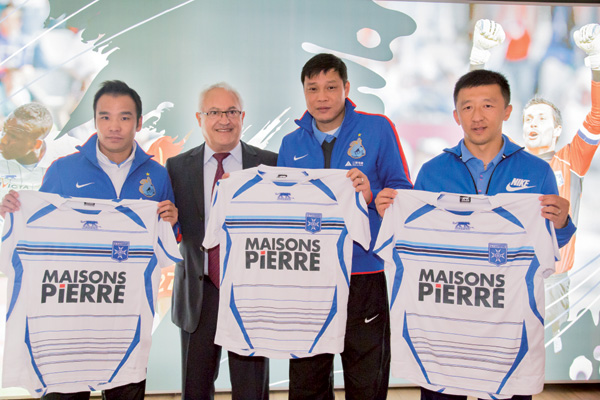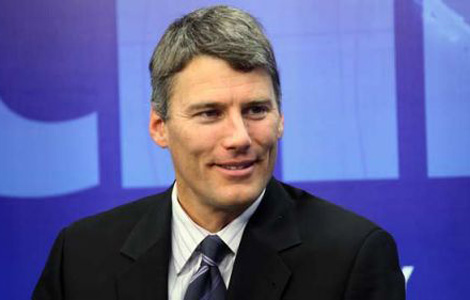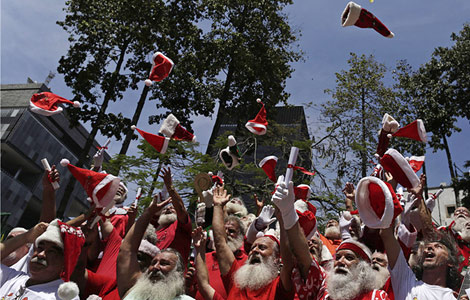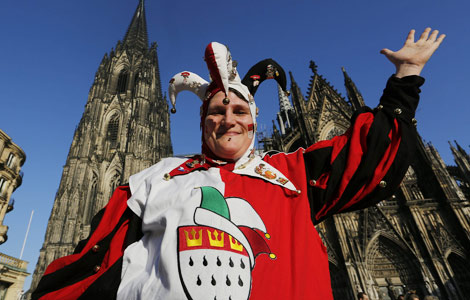Allez Auxerre! The way to goal
Updated: 2013-11-04 08:10
By Li Xiang in Paris (China Daily)
|
|||||||||||
|
AJ Auxerre's chairman Guy Cotret (second from left) with retired Chinese soccer player Fan Zhiyi (second from right) when he was invited to visit several clubs in France. Li Xiang / China Daily |
French soccer club seeks Chinese investors to help field triumphs
It has been 17 years since AJ Auxerre topped the French soccer league. Now languishing mid-table in Ligue 2, the Burgundy side is looking to Chinese investors to help them climb back to glory days and top form.
In return, the club that gave Eric Cantona his professional debut - and has honed the skills of Laurent Blanc, Basile Boli, Djibril Cisse and Bruno Martini among others - is offering to help improve soccer in China through establishing a specialized academy there and bring talented players to Europe.
Foreign capital has significantly changed the landscape of European football in recent years. Although the French league is much less popular in China compared with the English, Spanish, German and Italian ones, it has also been attracting more interest from Chinese sponsors.
Shanghai Sanei Elevator Co Ltd recently signed a new three-year sponsorship deal, worth about 1 million euros ($.37 million) a year with Ligue 1 club Stade de Reims.
Other French soccer clubs are now looking to score with Chinese investors in the hope of improving their financial situation and reviving the international appeal of the French game.
"We are eager to meet partners of Chinese soccer and companies interested in the exposure of the French market," says AJ Auxerre's chairman, Guy Cotret. "Bringing a Chinese player to the club's development will be part of the success.
"Long-term partnership may also open the door for equity partners to join in and create further business opportunities."
Like many clubs in France exposed to the economic downturn, Auxerre has been struggling to attract supporters to matches and viewers on TV. Its financial performance declined along with its on-field one. Two years ago it was relegated to Ligue 2.
The club is now in dire need of fresh capital to improve across the board, mainly by buying quality players. Promotion back to Ligue 1 and European competition will massively increase revenue from TV broadcasting rights.
"As a side-effect of globalization, there is a new balance in the national soccer league in which foreign investors play an active role," Cotret says. "This trend has globally improved sporting results and economic performances of national leagues while inflating the value of players in the transfer market."
Auxerre's decision to seek Chinese partners follows a recent wave of foreign investment in French soccer that caused great interest in Ligues 1 and 2.
The acquisition of Paris Saint Germain by Qatari investors led to similar deals such as the buyout of Monaco and Lens soccer clubs by Russian investors.
However, Auxerre is also keen on setting up a soccer academy in China to train young talent and potential star players. The club, founded in 1905, can offer a century of knowledge and expertise in club management and the training of players and coaches, Cotret says. And it has recently invested 9 million euros ($12.4 million) on its own training center.
"There is a real opportunity to implement the French soccer development program in China, one of the markets with the highest potential," Cotret says, noting that the size of the youth population in China, and the number of Chinese brands that are interested in investing in the world's most popular sport are opportunities to combine sport and economic development.
Setting up soccer academies is seen as an effective way for big European clubs to gain access to the Chinese market. Last year, Real Madrid and Chinese real estate developer Evergrande Group established an academy in Guangdong province.
Cotret says that with an annual budget of $23.3 million, Auxerre's business model differs from those of the top Spanish and English clubs. Auxerre sees itself more like an academy in itself, a university that focuses on training young players who have the potential to become superstars.
"The soccer business is not in very good shape at the moment. Many clubs are increasingly relying on training young players as an important source of revenue," he says, adding that Auxerre aims to be the first French club to open a training center overseas.
Fan Zhiyi, one of China's best-known soccer players - the first Chinese to play in the English leagues, the World Cup and played in Shanghai Shenhua - was recently invited to France, where he visited several clubs to learn about the way they work.
"There is a lot that China can learn from French expertise and philosophy in training young players, which emphasizes the holistic approach to cultivate a person, instead of just training a professional player," Fan says.
"French knowledge and experience in training soccer players could also offer a platform for cooperation between China and France in the soccer business."
Analysts say more Chinese companies are likely to follow the example of Shanghai Sanei Elevator Co in sponsoring Reims football club, because it is an effective means to take advantage of high-profile games to boost market exposure and brand awareness in the French and European markets.
lixiang@chinadaily.com.cn
Today's Top News
China, EU 'to launch investment treaty talks'
Leadership charts path
Security body to be set
Obama's legacy at stake in Iran nuclear talks
US and China should focus on the 'big picture'
Survey: Chinese workers just not engaged
Guangzhou limits vehicles on road to ease pollution
Renewable energy to steam ahead
Hot Topics
Lunar probe , China growth forecasts, Emission rules get tougher, China seen through 'colored lens', International board,
Editor's Picks

|

|

|

|

|

|






